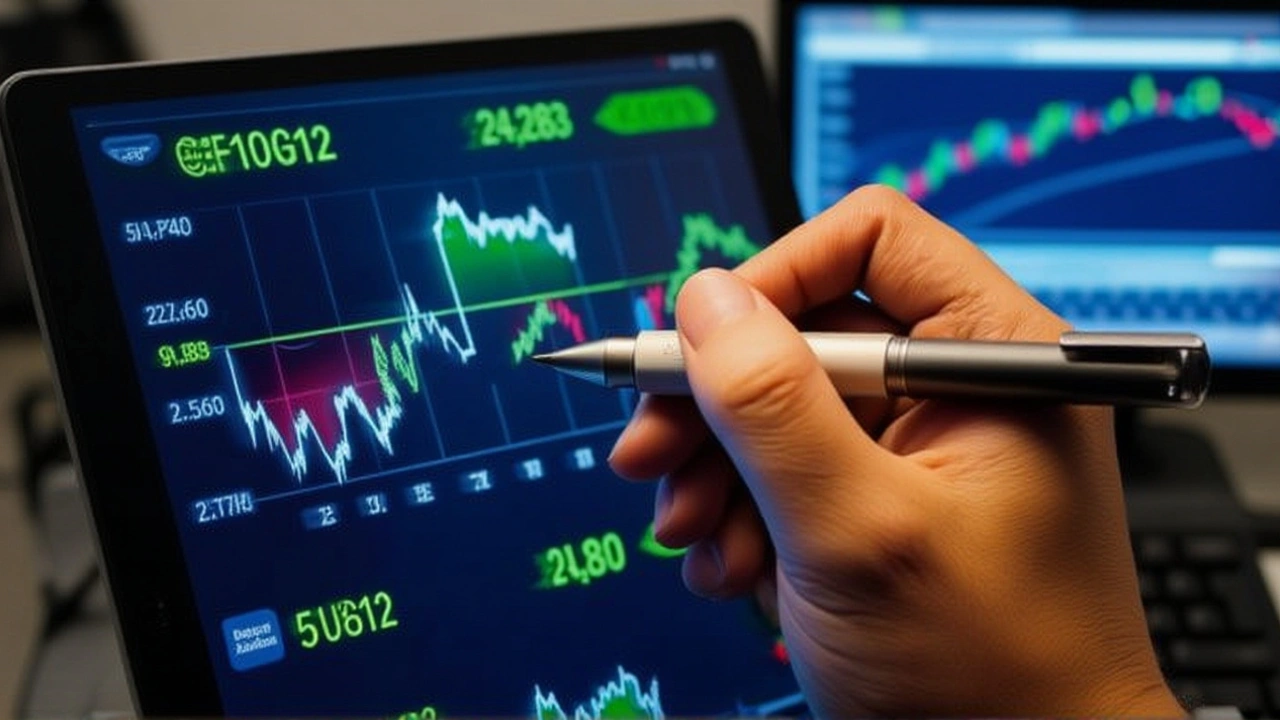 Oct, 9 2025
Oct, 9 2025
When Aradel Holdings posted a 19.53% gain in the third quarter, it became the emblem of a broader rally that lifted the All-Share Index to 142,710.48 points as of September 30, 2025. The surge, captured by Nigerian Exchange Limited (NGX), signaled an 18.95% year‑to‑date climb and pushed market capitalisation past the N90.5 trillion mark. In Nigeria, where equities are still largely driven by a handful of mega‑caps, the phenomenon was dubbed the "SWOOTs" – Stocks Worth Over One Trillion Naira. Analyst Wole Olajide noted that 17 of the 22 SWOOTs posted positive returns, underpinning the index’s bullish trajectory.
Background: Why the SWOOTs Matter
The term SWOOTs was coined by market watchers to flag the 22 companies that each command a market‑cap exceeding N1 trillion. Collectively, they own more than 70% of the total equity market, which consists of 147 listed firms. Their size means that even modest price moves can shift the All‑Share Index by hundreds of points. Historically, the SWOOTs have acted as bellwethers for investor sentiment, especially during periods of monetary policy shifts or macro‑economic turbulence.
Q3 2025 Performance Overview
From June 30 to September 30, 2025, the market saw 102 gainers versus 22 decliners. The aggregate market capitalisation rose to N90.581 trillion, and trading volume surged as investors chased the heavy‑weight winners. Daily snapshots released by Nairametrics on October 7 highlighted a mixed bag: MTN Nigeria rose 2.27%, Lafarge Africa ticked up 1.98%, while Fidelity Bank slipped 4.30%.
- Top gainer by market‑cap addition: Aradel Holdings – N13.1 billion in trades.
- Largest cement player: Dangote Cement – N1.5 billion traded.
- Most volatile tier‑one bank: GTCO PLC – down 4.04%.
SWOOTs Detailed Performance
Among the elite group, Aradel Holdings closed the quarter at ₦615 per share, with a market‑cap of ₦2.67 trillion. The oil‑centric firm logged a 37% jump in H1 revenue to ₦368 billion, driven by higher crude sales, even as administrative expenses rose. Other notable performers included:
- Zenith Bank – modest dip of 0.58% but steady dividend yield.
- United Bank for Africa (UBA) – modest gain of 0.71%.
- Dangote Cement – solid 0.93% lift, reflecting strong construction demand.
- Nigerian Breweries – 1.32% rise on good sales of flagship brands.
By contrast, GTCO PLC and Fidelity Bank faced pressure from tighter credit conditions and a tentative outlook for interest‑rate spreads.

Market Reactions & Analyst Views
Market commentators at Bizwatch Nigeria praised the resilience of the SWOOTs, noting that their cumulative addition of over N225 billion in market‑cap during the first two days of October points to sustained investor confidence. Wole Olajide of ACS highlighted that banking, cement, food, and oil & gas sectors all posted double‑digit gains, a rare alignment that could buffet the market against upcoming macro shocks.
The Central Bank of Nigeria is rumored to be preparing a takeover of fixed‑income payment platforms, a move that analysts say could further improve liquidity and bolster large‑cap performance heading into Q4.
Outlook for Q4 2025
Projections from Nairametrics suggest the All‑Share Index may breach the 145,000‑point barrier if SWOOT momentum holds. The key catalysts include:
- Continued earnings growth at oil‑focused firms as global crude prices stabilize.
- Infrastructure spending by the federal government, likely benefitting cement and construction‑related stocks.
- Potential monetary easing if inflation trends soften, which would favour banks.
Conversely, risks remain: foreign exchange volatility, any abrupt policy shifts by the Central Bank, and global economic headwinds could dampen the rally.

Historical Context: How This Quarter Stacks Up
Looking back, the Q3 surge dwarfs the 12% year‑to‑date gain recorded in the same period of 2023, when the market was still reeling from foreign capital outflows. The 2024 Q3 performance hovered around 7%, reflecting a more cautious investor base. By contrast, the 2025 rally is being powered not just by macro‑economic recovery but by a concentrated group of megacaps that are now accounting for a larger slice of the market’s total value.
Frequently Asked Questions
What defines a SWOOT and why do they matter?
A SWOOT – Stock Worth Over One Trillion Naira – is any listed Nigerian company with a market‑cap exceeding N1 trillion. Because they represent over 70% of the market’s total value, their price movements disproportionately influence the All‑Share Index, making them critical barometers for overall market health.
Which sector performed best among the SWOOTs in Q3 2025?
The oil‑and‑gas sector led the pack, with Aradel Holdings posting a 19.53% rise. Cement and telecommunications also posted solid double‑digit gains, bolstering the overall rally.
How did the All‑Share Index react to the SWOOT rally?
The index jumped 18.95% to finish Q3 at 142,710.48 points, its sharpest quarterly increase since 2021. The surge was largely driven by the aggregate N225 billion market‑cap addition from SWOOT stocks in early October.
What risks could undermine the Q4 outlook?
Key risks include renewed foreign exchange pressure, unexpected tightening by the Central Bank of Nigeria, and global commodity price shocks that could hit oil‑dependent SWOOTs.
Will smaller caps benefit from the SWOOT momentum?
Historically, a strong SWOOT rally lifts overall market sentiment, encouraging capital inflows that may spill over to mid‑ and small‑cap stocks. However, the magnitude of that spill‑over depends on liquidity conditions and investor appetite for higher‑risk assets.

Vishal Raj
October 9, 2025 AT 12:14The Q3 data shows a clear concentration of market moves around the SWOOT cohort.
With 22 firms accounting for over 70 percent of market cap, any price tweak reverberates through the index.
Aradel’s 19.53 percent climb alone contributed a sizable chunk of the N225 billion market‑cap addition.
The index’s 18.95 percent YTD rise is therefore not a broad‑based rally but a megacap‑driven surge.
This pattern mirrors the 2021 rebound where oil price recovery propelled a handful of giants.
Investors should note that the underlying earnings growth for most SWOOTs remains modest despite headline numbers.
For instance, Zenith Bank’s flat performance signals that banking margins are under pressure.
Dangote Cement’s sub‑1 percent gain, while positive, reflects stalled construction activity in some regions.
The heavy weighting also amplifies volatility when any of the top ten stocks wobble.
GTCO’s 4 percent dip in Q3, though small in absolute terms, dragged the banking sector lower.
The central bank’s rumored policy shift could further compress spreads, affecting bank earnings.
Meanwhile, oil‑centric firms like Aradel benefit from stabilized crude prices but remain exposed to global demand shocks.
The macro backdrop of easing inflation and potential fiscal stimulus adds a layer of uncertainty.
In summary, the rally is fragile and heavily dependent on continued megacap performance.
A diversified approach that looks beyond the SWOOTs would mitigate concentration risk.
Kailash Sharma
October 22, 2025 AT 17:02What a dramatic twist! The market is basically riding a single horse and any stumble feels like a crash.
Everyone’s staring at the SWOOTs like they’re the only stars on stage.
But don’t be fooled – one slip and the whole index could tumble.
Stay sharp and watch those mega‑caps like a hawk.
Shweta Khandelwal
November 4, 2025 AT 20:50Yo the whole SWOOT hype is just a smokescreen put up by the elites to keep us dumb.
They want us to think the market’s booming while they pull strings behind the scenes.
All those trillion‑naira tags are just numbers to scare the little guys.
Wake up, Nigeria! The real game is being played in shadowy boardrooms.
sanam massey
November 18, 2025 AT 01:38It's fascinating how a handful of giants can shape the destiny of an entire market.
From a philosophical angle, this reflects the age‑old tension between concentration and diversity.
If the SWOOTs continue to prosper, smaller firms might find new pathways to growth through collaboration.
jinsa jose
December 1, 2025 AT 06:26While the data paints a picture of robust performance, we must not overlook the ethical dimensions of such concentration; it raises questions about market fairness and equitable access to capital.
In the grand scheme, a system that leans heavily on a few trillion‑naira entities risks marginalizing the broader entrepreneurial spirit that fuels sustainable development.
Suresh Chandra
December 14, 2025 AT 11:14Thats sooo cool to see the market vibing! 🚀
Hope the SWOOTs keep the good vibes rollin, typos and all lol 😂
Digital Raju Yadav
December 27, 2025 AT 16:02Great signs ahead!
Dhara Kothari
January 9, 2026 AT 20:50Feeling hopeful about the momentum, let’s keep the optimism alive 🙂.
Sourabh Jha
January 23, 2026 AT 01:38Disgraceful how foreigners try to meddle in our market – our SWOOTs are the real pride of Naija!
harsh srivastava
February 5, 2026 AT 06:26Keep an eye on the fundamentals behind each megacap; strong earnings will sustain the rally.
Remember to diversify where you can – even small caps can shine when liquidity improves.
Stay motivated and keep learning the market’s nuances.